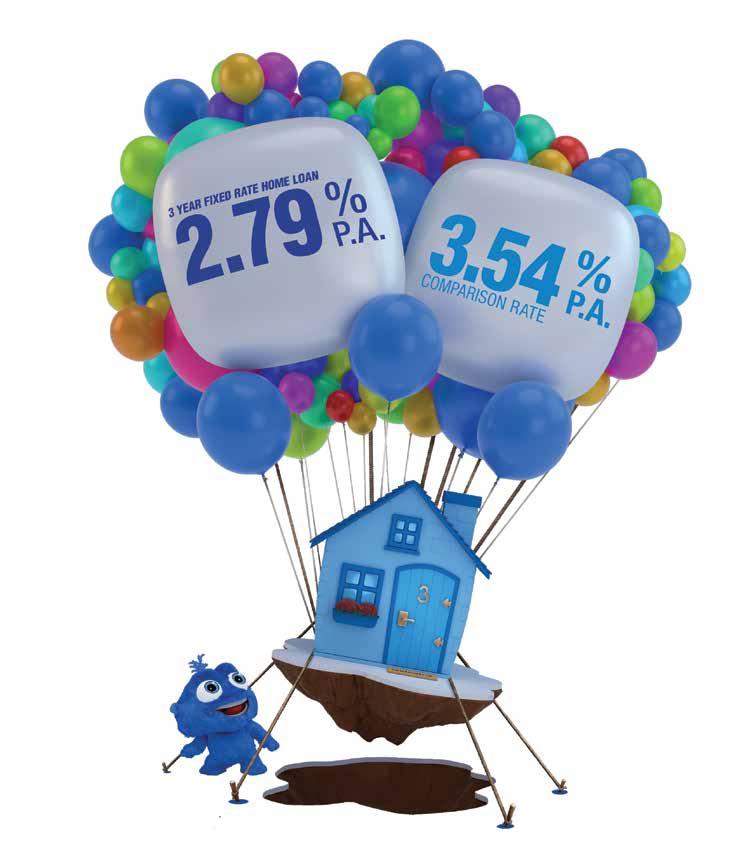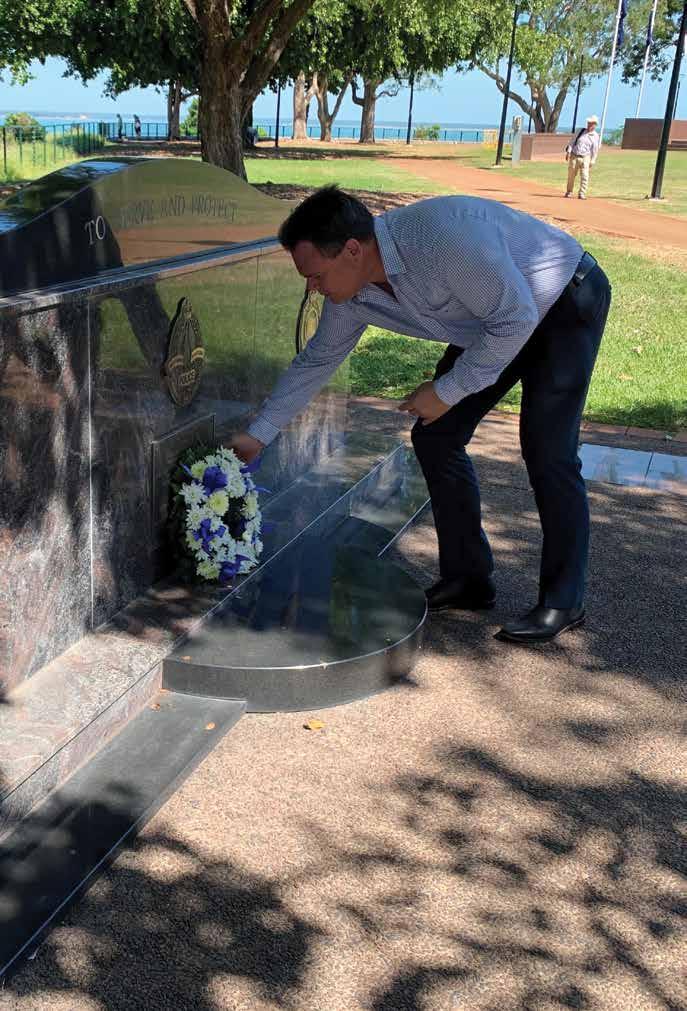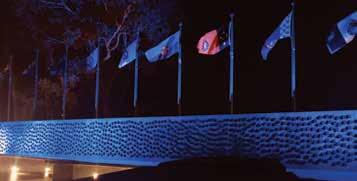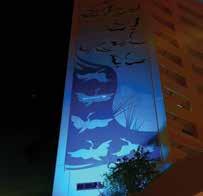
13 minute read
The sacrifice of frontline workers: opinion editorial
FRONTLINE HEROES
As we transition to living in a world none of us have experienced before, the new ‘normal’ so to speak, it’s timely to reflect on the very people we often look to in a time of crisis, the people who we call on when there is no one else. Frontline workers.
So, who are they and what do they sacrifice? The current pandemic which has forced most of the population into forced isolation or strict social distancing, still requires a level-headed and considered response from our frontline. Our police, our fire fighters, our paramedics, our health workers, our defence, our aged care workers, and our teachers to name a few. They all play a vital part, now more than ever, not just keeping us safe but keeping the community going. As the representative body of police officers in the NT, I speak on behalf of the Northern Territory Police Association (NTPA) and its 1,500 plus members. That refers not only to our police on the frontline, but those in specialist divisions, essential support roles and communications. They are often the only line between community control and complete chaos. They run towards danger when others are running away, they confront the shady side of our society, and the horrors that go with it. Then they go home to their families to try and lead a “normal” life. Now more than ever, they are being asked to be everywhere and enforce unprecedented restrictions, at a time when COVID-19 has changed our world. It is constantly on their minds. They are dealing with strangers every day, often hands-on due to the nature of the job, and this all impacts on their mental wellbeing. Day-to-day policing does not stop. As well as now being on our borders and vehicle control points across the Territory, our members continue to walk the beat, dealing with the minefield of youth crime, domestic violence, anti-social behaviour and other alcohol-related harm and crime, trying to stop the drugs, attending serious or fatal motor vehicle accidents, and being the shoulder to cry on when a loved one passes away. It is all real, and it never stops. In the last few weeks, I have seen the policing environment change like never before, and once again I have seen our members roll up their sleeves, at times leaving their families for days and weeks on end, to get on with the job of protecting you, the public. When you talk about heroes, and what that really means, we often refer to our sporting heroes, people of influence, and people who are close to us. But our police and other frontline workers surely hold that title for now. When daily life has changed for most, when hundreds of thousands, possibly millions of people have lost their jobs or their businesses and times will continue to be tough, our police will be there as always for you, and with you, keeping the community safe. We are living in unprecedented times and this calls for unprecedented actions, such as tough decisions by government and health experts, which are necessary at a time of such high risk to the wider public. But more can be done. Increased protection through legislative change, such as increasing minimum sentencing or large immediate fines for attacks on police and frontline workers should be considered urgently. States such as Western Australia and more recently New South Wales have introduced changes to further protect their frontline workers, and South Australia is looking to follow suit. The Northern Territory can’t be left behind when it comes to caring for the very people who care for us. Our police and frontline workers shoulder the daily risks associated with this global pandemic and remain at the forefront of serving our community, at the sacrifice of their own health. For that we must all stand up every single day and say thank you. Protecting them, protects us all. This editorial by President Paul McCue originally appeared in the NT News on Sunday April 12, 2020
Our lowest fixed rate ever!
Lock in our lowest ever 3 Year Fixed Rate, it’s easy to apply and you could save thousands! Call 8928 9500, visit our Palmerston branch at Gateway Shopping Centre, or apply online policecu.com.au
Police Credit Union Ltd (PCU) ABN 30 087 651 205 AFSL/Australian Credit Licence 238991. Maximum Loan to Valuation Ratio is 80%. New lending only with a minimum amount of $150,000. Terms, conditions, fees, charges and lending criteria apply. Owner Occupied only. Interest Rate reverts to the Discount Variable Rate after the fixed rate period. Full details upon request. Interest rates current as at 13/05/2020 and subject to change. Comparison rate is based on a secured $150,000 loan over 25 years. WARNING: This comparison rate is true only for the examples given and may not include all fees and charges. Different terms, fees or other loan amounts might result in a different comparison rate. *Special Offer available until 30/06/2020, excludes new ‘Construction’ and ‘Business Banking’ loans, renegotiations and loans to a Trust or Self Managed Super Fund. PCU reserves the right to withdraw or extend this offer. Please consider if the product is right for you.
WHAT IS A COMPARISON RATE AND WHAT SHOULD YOU LOOK FOR WHEN CHOOSING A LOAN?
When it comes to choosing a loan, there are many factors which may influence your decision. One such factor is the interest rate.
Understanding interest rates and other fees associated with loans can be challenging, making it difficult for you to determine whether your chosen loan meets your needs. To help you make these decisions, the government has legislated that, in addition to displaying the advertised interest rate for a loan product, financial institutions must also display a comparison rate. The formula used to calculate the comparison rate is regulated by the Consumer Credit Code and all financial institutions must use the same method to calculate this rate.
WHY IS A COMPARISON RATE HELPFUL?
The comparison rate is helpful as it gives you, the consumer, a clearer indication of the actual costs of the loan. This helps you to more easily compare loan products from different financial institutions.
WHAT DOES A COMPARISON RATE INCLUDE?
The comparison rate reflects the actual annual interest rate, together with the loan amount, the term of the loan and the required repayments. It also includes many of the fees and charges associated with taking out the loan. This may include things such as establishment or set up fees, annual or ongoing fees, valuation and mortgage documentation fees and settlement fees. As well as factoring in fees and charges, a comparison rate may also be calculated using any discounted introductory rate (often called a Honeymoon rate) or in the case of a loan with a fixed rate period, it will include the revert or ‘roll out’ rate of the loan after the fixed period expires.
WHAT IS NOT INCLUDED?
The comparison rate does not include items such as Government charges i.e. Stamp Duty or fees which may apply for optional events throughout the loan, such as redraw, loan variation fees or late payment fees.
WHAT SHOULD I LOOK OUT FOR?
Generally, the closer the comparison rate is to the advertised rate, the less fees and charges there are associated with the loan. A home loan with a very low advertised rate might initially look appealing, but closer inspection of the comparison rate may reveal some additional costs that might not benefit you in the long run.
WE’RE HERE TO HELP
If you are unsure about the costs associated with a loan, always make sure to ask. For more information on our loans or assistance with applying for a loan, call our Palmerston branch on 8928 9500 or speak to our Platinum Relationship Manager, David Hair on 0458 083 270.
President Paul McCue laying a wreath at the NT Police Memorial Wall

VOID OF LOSING FOUR COLLEAGUES CAN NEVER BE FILLED
There is a palpable sense of helplessness among Victoria’s police force, borne out of the realisation that nothing we can do now will resolve this extraordinary loss, writes Wayne Gatt
The messrooms and corridors are silent. The words, laughter and camaraderie that make them the heartbeat of the policing experience, have been suppressed by the tragic reality that our family is four short. There is a palpable sense of helplessness among our members, borne out of the realisation that nothing we can do now will restore this extraordinary loss. As police we help, we turn up, we fix, we make things better. When we can’t, particularly for our own, words don’t seem adequate, so silence prevails. That the lives of these four dedicated police officers were taken during such a routine aspect of policing, resonates with all police. Every member will have returned to a messroom with their colleagues after intercepting a vehicle in this manner, sometimes 20-30 times in a shift. These four members did not. That’s incredibly hard to reconcile, and it’s impossible for our members to ignore as they arrive for their next shift and prepare to undertake the same task that cost their colleagues their lives. Through their varying ages, policing experience and their lives and loves outside of the job, the members we have lost represent all police. Leading Senior Constable Lynette Taylor was 60. She was working at the Road Policing Drug and Alcohol Section, where she had spent much of her career. Lynette was married with two sons. Senior Constable Kevin King worked at Nunawading Highway Patrol. He was 50. Married, with three sons. Constable Glen Humphris was 32. His career was just beginning. He graduated from the Police Academy in March and was doing a placement at Road Policing Drug and Alcohol Section. He grew up in New South Wales and was living in Melbourne with his partner. Constable Josh Prestney was 28. He graduated from the Academy in December. He was doing his placement at Nunawading Highway Patrol. He is survived by his parents and brother, who is also a police officer. Individually and collectively they have left a deep void that can never be filled. For their families, their friends and their colleagues. In policing, you always expect to run into a colleague again. The bonds you form are strong, because they’re underpinned by the realisation that at some point that person has or will have your safety in their hands. It’s a reliance and trust that only emergency services workers know. This tragedy has reached into every police station in Victoria. Some members will know the four officers personally, some will have graduated with them, shared a shift or a job with them or socialised with them, but every member could have been them on Wednesday evening. What these officers were doing in their final moments goes to the core of policing, to the oath they took, some recently and some decades ago, to keep the peace and help those in need of assistance. That duty took them to the Eastern Freeway on Wednesday evening. Had they not intervened when and where they did, another driver, a family or a pedestrian could have been seriously injured or killed. Police don’t get to pick and choose where their duty will take them. Sadly, that’s dictated by those they are seeking to protect the community from. Some jobs are high risk, some are seemingly lower, yet by virtue of the nature of the job all police do, every job carries the inherent danger that it could be your last. That’s a burden all police knowingly shoulder, but one that rests heaviest on their families, who can do little but hope that their loved one returns home safely at the end of their shift. The people who take such pride in knowing their son, daughter, husband, wife, sister or brother has made a career and life choice to put others before themselves, are the same ones with so much to lose when that choice has such final and devastating consequences. In lieu of the silence befalling the force at this devastating time, we hope the voice of the community, so rich in its gratitude and respect for the sacrifice their loved ones have made, will provide some comfort to the families when little else can. We will not forget them.
Wayne Gatt is the Secretary of The Police Association Victoria. This article appeared in the Herald Sun on Thursday April 23 and has been reproduced with permission from TPAV.
TRAGIC LOSS OF POLICE LIFE
A major crash on Cross Road, Urrbrae, claimed her life and injured her husband, former sworn member and now general counsel to the commissioner, Peter Shanahan. Joanne was a highly accomplished police officer who had given more than 38 years’ loyal service to policing. A woman of solid intellect and great application, she had worked in a range of investigational and other fields after beginning her police career in 1981. Joanne was widely known and respected among Police Association members and enjoyed the recognition of her interstate counterparts. Her death adds to the pall of grief which already hangs over the Australian police family after the loss of four Victorian officers. For many of those who worked with Joanne and/or knew her on a personal level, the pain of losing her, so suddenly and unexpectedly, is certain to be overwhelming. The Association is grateful for the messages of condolence which have come from around the nation. Interstate police have known not only Joanne through policing but also Peter through his long-time chairmanship of Police Health. The Association is proud to have counted Joanne among its members and is as deeply devastated as her closest friends and colleagues. Joanne was thoroughly devoted to her family – Peter and their two adult children. The true measure of the value of her presence in their lives will be evident in the decades to come. It will lie in all the precious family moments of which an unjust death has robbed a close, loving family. We, of course, extend our greatest sympathy to Peter and the children. But words are of little, if any, value in the face of a loss so profound. Our aim should be, and is, to provide Peter and the children, and our grieving members, with all the support it is within our power to provide. “Look after my family,” is the simple but heartfelt request Joanne would have made of us, and we will not fail her.
The SA police community has suffered a crushing loss with the untimely death of Chief Superintendent Joanne Shanahan APM.
BY MARK CARROLL APM
Police Association of South Australia President



JANUARY 2020 POLICENEWS KOKODA TREK 39 TODAY SHE HAD TO TAKE A DEAD BABY FROM THE MOTHER’S ARMS.

ANY WONDER SHE’S QUIET AND WITHDRAWN?







